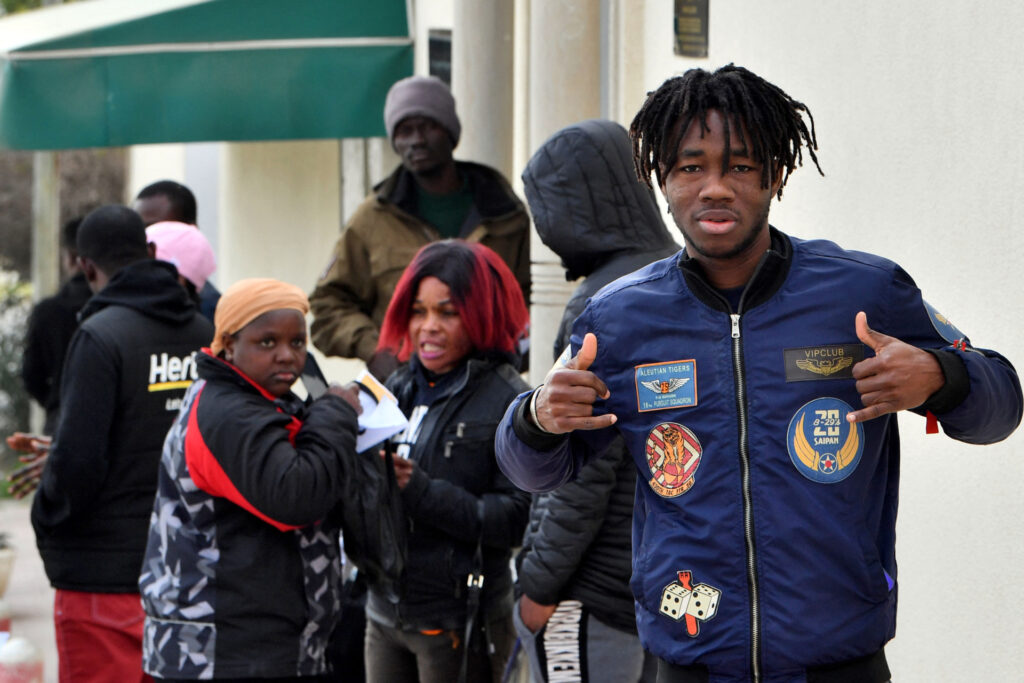(AFP) – A steady flow of taxis has rolled up outside the Ivorian embassy in Tunis in recent days, depositing dozens of migrants who say they no longer feel safe amid an officially sanctioned climate of fear.
After a wave of arrests in recent weeks, President Kais Saied gave a speech on Wednesday that critics said was openly racist.
Many sub-Saharan Africans in Tunisia are now heading for the exit.
“We want to go home,” said Constant, who arrived at the embassy early on Friday in the hope of getting her paperwork in order.
In his speech Saied had ordered officials to take “urgent measures” to tackle irregular migration, claiming without evidence that “a criminal plot” was underway “to change Tunisia’s demographic make-up”.
Tunisian President Criticised for Pointing Out Illegal Migration Is Designed to Change Demographics https://t.co/UQFCdKkT3J
— Breitbart London (@BreitbartLondon) February 24, 2023
His comments, praised by French former presidential candidate Eric Zemmour, were seen by many as inciting violence against sub-Saharan Africans living in Tunisia legally or illegally.
Aboubacar Dobe, head of a radio station for French-speaking migrants, said it was “clear that things are different since Saied’s speech”.
“When it was just the (recently created far-right) Tunisian Nationalist Party or on social media, people thought the state would protect them,” he said.
“Now, they feel abandoned.”
The African Union also expressed concern following Saied’s remarks on migrants, calling on its member states to “refrain from racialised hate speech that could bring people to harm”.

Ivorians gather in front of the Ivory Coast embassy for their repatriation to Abidjan, on February 24th, 2023 in Tunis. Tunisian President Kais Saied called on February 23rd for his government to take care of “legal” migrants from sub-Saharan Africa while doubling down on controversial remarks that illegal immigration was causing “demographic” change. (Photo by FETHI BELAID/AFP via Getty Images)
Harassment and intimidation
Outside the Ivorian embassy, one couple arrived after being evicted from their apartment, their worldly belongings in backpacks and suitcases.
Three other young women were dropped off by a smartly dressed Tunisian woman.
“They’ve been working at my beauty salon for two years,” she said. “They’re leaving now because they don’t feel safe.”
Constant, who has been unemployed for six months, said she has set up a WhatsApp group for Ivorians wanting to go home.
“I’m here to organise an exit permit, because I’ve overstayed by four years and I can’t afford to pay the fine” of more than 1,000 euros ($1,055), she said.
Other migrants spoke of harassment and intimidation, including fires lit outside their buildings or attempts to break in.
“The landlords are kicking us out; people beat us up or mistreat us,” said Wilfrid Badia, 34, who has spent six years in the North African country eking out a living on casual jobs.
“To be safe, we decided to come to the embassy to sign up to go home.”
Hosni Maati, a lawyer who helps an association for Ivorians in Tunisia, said that “since the president’s speech, (Tunisians) have totally lost it”.
Maati said sub-Saharan Africans had been living without papers in Tunisia for years as authorities turned a blind eye.
Bureaucratic obstacles prevented many from regularising their status, making them easy targets for exploitation by unscrupulous employers as cheap labour.
Nigel Farage has warned that British communities are being “changed beyond recognition” and quality of life eroded as the Conservative Party increases net immigration to over half a million a year to satisfy bosses’ hunger for cheap foreign labour.https://t.co/hlkaYjTxYj
— Breitbart London (@BreitbartLondon) November 25, 2022
‘Mob justice’
Authorities began a wave of arrests targeting migrants two weeks ago and have so far detained around 400 people, rights groups say. Most have since been released.
“You can’t solve such a complex situation by making a speech and arresting people left, right and centre,” Maati said.
Jean Bedel Gnabli, deputy head of an association for sub-Saharan migrants, said the whole community — also including Senegalese, Guineans, Congolese and Comorans — was living in fear.
“They feel like they’ve been handed over to mob justice,” he said.
Even sub-Saharan African students at Tunisian universities, who in principle are in the country legally, have been affected.
AESAT, an association that supports them, sent out a message this week urging them “not to go out, even to go to class, until authorities ensure we are properly protected from these attacks”.
Gnabli predicted the Ivorian government would organise repatriation flights for those wishing to leave.
In the meantime, he called on Tunisian authorities to “guarantee their security” and “treat them with dignity”.
In the Bhar Lazreg neighbourhood of north Tunis, streets of informal African restaurants and barber shops have closed, apparently for good.
A creche that had taken care of dozens of African children was nowhere to be seen.
Ivorians Blede Dibe and Michel Yere worked manual jobs in the neighbourhood until they found themselves abruptly unemployed two weeks ago.
But they agreed there was little point in returning to their home country.
“Go back to do what? There’s no work for us in Ivory Coast,” they said in unison.
Sweden: Around 90 Per Cent of 2015 Migrants with Residency Status Are Unemployed https://t.co/G4IhlnXBCx
— Breitbart London (@BreitbartLondon) October 6, 2019



